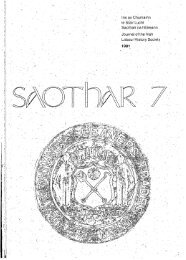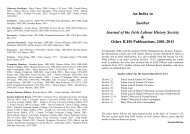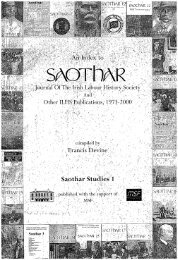86 SAOTHAR 13existed in the countryside, hopelessly caricatured and thus ultimately vindicated the FF approach.More significant for the. longer term was the social republican analysis which culminated in theRepublican Congress split. For at the heart of this analysis was a central ambiguity about the nature ofFF. Although labelled a middle class party, it was reckoned to have progressive tendencies within it.For 0' Donnell these comprised more than workers and small farmers in the rank and file, they includedindividual prominent members and even de Valera was not seen as fundamentally hostile to progressivepolicies. In asking the question why workers voted FF it is necessary to remember that O'Donnellhimself saw his agitational and ideological work as aimed at pushing FF to the left rather than displacingit. 21From 0' Donnell down to the distinctions that were still made between FF and the 'really' bourgeoisparties by some sections of the left in the 1960s, the weaknesses of left analysis mirror the strength ofFF hegemony . When FFJeaders described their party as a 'national movement' rather than a party theywere reflecting in their own way on a reality which the left failed to come to terms with for decades.To label FF a middle class party would only have been to discredit them with the working class if therewas a widespread conception that the stage of nation-building was over and that the fundamentalcontradiction in the society was a class one. Instead FF could relatively easily give the problems ofbackwardness a nationalist inflection which provided the basis for a pan class consensus around the poleof development In the 1930sa familiar pattern of left discourse was established - the didactictransmission to the masses of 'truths' which are in fact obvious to them. If workers voted FF in the 1930sit was not because they had failed to notice that it was a 'middle class' party. More fundamentally itwas because ~e realities of Irish economic backwardness continued to provide a base for a popularnationalism of development which was assented to not only by the socialists of the Labour Party butalso by their revolutionary scourges - the 0 'Donnells and Gilmores - who simply warned the workingclass that FF might not-ultimately deliver. Leftism had moved in a decade from a syndicalismunconcerned with the significance of state power for the political and ideological resources of thebourgeoisie to a position where the dispute with the bourgeoisie was over who could best complete thenational revolution - an ideological collapse which syndicalism, for all its faults was incapable of.Support for a bourgeois project of economic development and class awareness are not, in fact,necessarily contradictory. It all depends on the con jucture, nationall y and internationally. The workingclass can have an interest in the development and success of its national capitalist class. FF wouldexperience problems not by being identified with the bourgeoisie but with a bourgeoisie that was visiblyfailing - from the early 1940s .. onwards -to'deliver employment. But the failure of protectionism didnot fatally damage its sponsors because it was still possible to unfurl another strategy for developmentwhich, while at variance with traditional Sinn F6in economic policy, could still derive support from thedismal facts of emigration and unemployment and their demonstration that 'real' independence had notbeen achieved.The new policies of free trade, EEC membership and attraction of foreign capital appeared to someofFianna Fail's opponents on the left to open up new possibilities. The social republicans of the 1960s,together with a section of the Labour Party in the Dail, tried to arouse the masses by pillorying Lemassand Lynch for betraying the core principles of 'republican' economic policy.22 More forward-looking,if equally unsuccessful, were those in the Labour Party who saw in the new policies, and in theindustrialisation they encouraged, the hope of a modernisation process which would render traditionalparty cleavages redundant. But despite all the conservative encrustations that FF had developed as thenormal party of government between 1932 and the 1960s, despite even the less salubrious aspect of itsrelationship with sections of the bourgeoisie revealed in the T ACA episode,23 the party would not easilygive up its populist image. For protectionism and welfarism it now substituted a form of practicalKeynesianism and corporatism.The crisis of the traditional protected industries in the freer trading conditions of the 1970s, togetherwith the international recession, have put the material basis for the party's new strategy underconsiderable strain. Intersecting with severe factionalism in the party, a legacy of the Arms Trial of
ESSAYS 871970, it created the conditions for a Fine Gael upsurge in the late 1970s and early 1980s. However, thisdevelopment of Garret FitzGerald ~s 'social-democratic' Fine Gael would be short-lived and largely atthe expense of the Labour Party.24 Or FitzGerald's increasingly neo-liberal prescriptions for theeconomy as Taoiseach would make it easier for FF to reassert its progressiveness in opposition. In officethe party, even while implementing some radical:and intensely unpopular public expenditure cuts, hasensured that it will escape the 'Thatcherism', label, by bringing the leadership of ICTU along in itsProgramme/or National Recovery.25The left, ever hopeful that FF will alienate its working class supporters, should ponder the lessonsof the 1930s. Populism then depended not simply on the quality QHhe economic and social policies itproposed, but on the denunciation of them by the most conservative elementsin political life. Popularappeal depends on the overall context in which policies are proposed. As the Economist noted in itsrecent provocative survey of the Republic, Haughey's recent toughness on public spending does notat all justify a comparison with Thatcher, for he has not broken with what it refers to as 'The vaguelyformulated socialism of his Fianna Fail party'. What the Economist's blue-tinted spectacles define associalism is more correctly specified later as Haughey's tendency to see himself as 'the embodimentof the spirit of Ireland, the true voice of the common man' and his reluctance to take on 'Ireland'scosseted public sector trade unions'. 26 The continuing ability of Fianna Fail to reproduce a populistappeal of this sort, half a century since it was originally developed, would appear to make left hopesof a realignment produced by the pressure of economic crisis as chimerical as ever.NotesHenry Patterson1. M. Peillon, Contemporary Irish Society, (Dublin, 1982), p. 113.2. ibid., p. 114.3. A. Przeworski, Capitalism and Social Democracy, (Cambridge, 1986), p. 47.4. ibid.5. Joseph Lee, 'Irish Nationalism and Socialism: Rumpf Reconsidered', Saothar 6, 1980, p. 59.6. Tom Garvin, The Evolution of Irish Nationalist Politics, (Dublin, 1981); Peter Mair, The Changing Irish PartySystem, (London, 1987).7. E. Rumpf and AC. Hepbum, Nationalism and Socialism in Twentieth Century Ireland, (Liverpool,1977).8. Dick Walsh, The Party, (Dublin, 1986), ch. 10.9. Martin Mansergh (ed.), The Spirit of the Nation: The Speeches and Statements of Charles 1. Haughey, 1957-1986, (Dublin, 1986), p. 198.10. Mair, op.cit., p. 17.1l. Irish Times, 6 February, 1987.12. Sean Cronin, The McGarrity Papers, (fralee, 1972), p. 14l.13. Peter Pyne, 'The Third Sinn Fein Party, 1923-26' in Economic and Social Review 1, 1970.14. 'Socialism and Irish Nationalism' in James Connolly, Socialism and Nationalism, ed. Desmond Ryan,(Dublin, 1948). .15. Brian Reynolds, 'The Formation and Development ofFianna Fail, 1926-1932', DPhil, Trinity College, Dublin,1976, p. 138.16. P.E.I. O'Connor, 'Syndicalism in Ireland, 1917-1923,' PhD, Cambridge, 1984.17. ibid., p.292.18. AnPhoblacht, 3 October, 1931.19. Peadar O'Donnell, Monkeys in the Superstructure, (Galway, 1986), p. 26.20. An Phoblacht, 24 March, 1928.21. See his revealing reflections on Fianna Fail in his pamphlet The Bothy Fire and all that, (Dub'lin, 1937).22. Paul Bew & Henry Patterson, SeanLemass and the Making of Modern Ireland,-(Dublin,.l982),.pp. 173-186.23. Walsh, op.cit., pp. 83-88.24. Mair, op.cit., p.42.25. The Progranune seeks not only to regenerate the economy but to 'improve the social equity of our society ... '
- Page 1 and 2:
JOURNAL OF THE IRISH LABOUR HISTORY
- Page 3 and 4:
ContentsPageEditorial: Labour Histo
- Page 5 and 6:
EDITORIAL 3freedom to participate i
- Page 7 and 8:
CorrespondenceThe Irish Labour Part
- Page 9 and 10:
; ~ ; ,The Decline and Fall of Donn
- Page 11 and 12:
THE DECLINE AND FALL OF DONNYBROOK
- Page 13 and 14:
THE DECLINE AND FALL OF DONNYBROOK
- Page 15 and 16:
·' THE DECLINE AND FALL OF DONNYBR
- Page 17 and 18:
THE DECLINE AND FALL OF DONNYBROOK
- Page 19 and 20:
THE DECLINE AND FALL OF DONNYBROOK
- Page 21 and 22:
THE DECLINE AND FALL OF DONNYBROOK
- Page 23 and 24:
THE DECLINE AND FALL OF DONNYBROOK
- Page 25 and 26:
,'-,;-''''.A PASSAGE TO BRITAIN 23C
- Page 27 and 28:
A PASSAGE TO BRITAIN 25only in the
- Page 29 and 30:
A PASSAGE TO BRITAIN 27clothing._De
- Page 31 and 32:
A PASSAGE TO BRITAIN 29established
- Page 33 and 34:
;:-.",.- .. .", ...... '.:. '
- Page 35 and 36:
LOUIE BENNETI 33feminist movement w
- Page 37 and 38: :... ~: ."
- Page 39 and 40: -.- '.LOUlE BENNETT 37While there i
- Page 41 and 42: LOUIE ~ENNEIT 39Xl's encyclical Qua
- Page 43 and 44: LOUIE BENNEIT 41Bennett's own relat
- Page 45 and 46: LODIE BENNETT 43109; IWWU resolutio
- Page 47 and 48: Essays in ReviewCosherers, Wanderer
- Page 49 and 50: ••• .".'. >. '~"ESSA YS IN RE
- Page 51 and 52: ESSAYS IN REVIEW 49ConnolIy:Myth an
- Page 53 and 54: ESSAYS IN ~EVIEW 51tion' in the Int
- Page 55 and 56: ESSAYS IN REVIEW53International:'I
- Page 57 and 58: REVIEWScontroversy is real history.
- Page 59 and 60: REVIEWSJoe Monks was among the earl
- Page 61 and 62: REVIEWSnolly-Column Song','Proudly
- Page 63 and 64: REVIEWSresulting from the arrival o
- Page 65 and 66: REVIEWS,63the book by means of an a
- Page 67 and 68: REVIEWSlogue, it is hardly surprisi
- Page 69 and 70: The Team For All Workers ...CULIAIB
- Page 71 and 72: ESSAYS 69mission and moral refonn.l
- Page 73 and 74: .. ...... ~.~ -~ .'- '.ESSAYS. 71fr
- Page 75 and 76: ESSAYS 73claimed authority but whic
- Page 77 and 78: ESSAYS 75provided the basis for soc
- Page 79 and 80: ESSAYS 779. For comparisons see E.T
- Page 81 and 82: ESSAYS 7952. Annals of Christ Churc
- Page 83 and 84: ESSAYS' 81Fianna Fail and the Worki
- Page 85 and 86: ESSAYS 83Eireann in 1925 visibly di
- Page 87: ESSAYS 85recognition of the impract
- Page 91 and 92: ESSAYS89The Irish Immigrants' Contr
- Page 93 and 94: ESSAYS" 91Although anti -Catholic p
- Page 95 and 96: ESSAYS 93McCowie played a key role
- Page 97 and 98: :. -,,'.' ',. .~.,:.ESSAYS 95Althou
- Page 99 and 100: ESSAYS 97young girl of their own ba
- Page 101 and 102: SourcesIrish Labour History Society
- Page 103 and 104: SOURCES 101INovember, 1971 to no. 1
- Page 105 and 106: SOURCES 103would claim credit for t
- Page 107 and 108: SOURCES105Sources for Irish Labour
- Page 109 and 110: SOURCES 107NorthWest Archives and L
- Page 111 and 112: SOURCES 109In 1966 the Finnish gove
- Page 113 and 114: TURNINGANEWLEAFThe CPSSUis the larg
- Page 115 and 116: REMINISCENCE 113us due to my politi
- Page 117 and 118: REMINISCENCE 115when Jim was presen
- Page 119 and 120: REMINISCENCE 117of Dail Eireann. 17
- Page 121 and 122: REMINISCENCE 119NotesThe above arti
- Page 123 and 124: DOCUMENT STUDY 121James Connolly in
- Page 125 and 126: DOCUMENT STUDY123SOCIAL DEMOCRATIC
- Page 127 and 128: DOCUMENT STUDY 125proletariat of th
- Page 129 and 130: DOCUMENT STUDY 127the support of Je
- Page 131 and 132: DOCUMENT STUDY 12926. The Workers'
- Page 133 and 134: 131BibliographyA Bibliography of Ir
- Page 135 and 136: BIBLIOGRAPHY 133Compton, P.A. Demog
- Page 137 and 138: BIBLIOGRAPHY 135Levine, I. and Madd
- Page 139 and 140:
BIBLIOGRAPHY 137Turner, M. 'Towards
- Page 141 and 142:
BIBLIOGRAPHY 1394. Land and Agricul
- Page 143 and 144:
BIBLIOGRAPHY 141Clogher Record12 (2
- Page 145 and 146:
BIBLIOGRAPHY 143Political Research
- Page 147 and 148:
BIBLIOGRAPHY 145Pres, 1987.O'Brien,
- Page 149 and 150:
147Notes on Contributorsf onathanBe
- Page 151 and 152:
1901: Ireland's first general union
- Page 153 and 154:
ELECTRICAL TRADES UNION .Establishe





